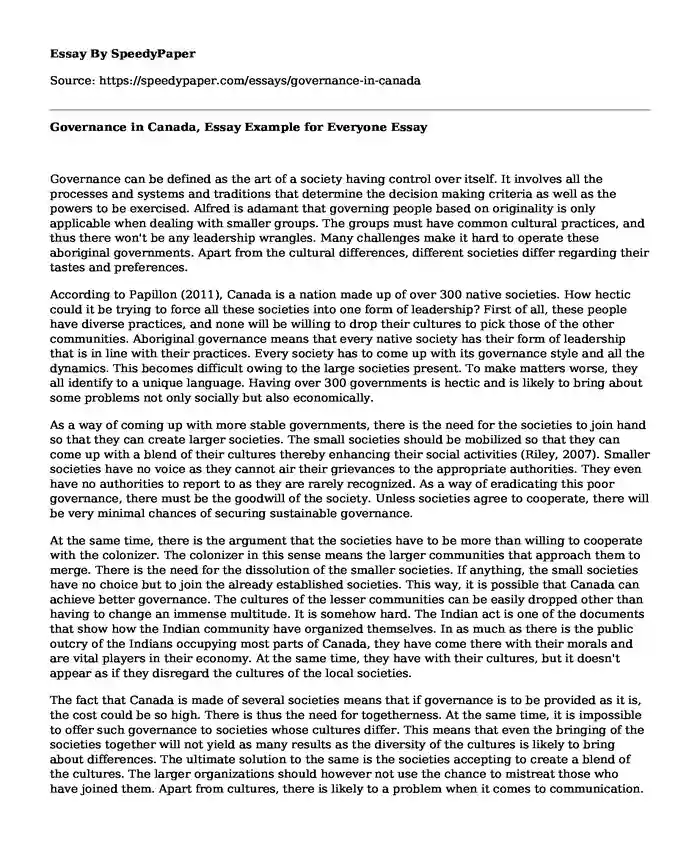
| Type of paper: | Essay |
| Categories: | Government Multiculturalism |
| Pages: | 3 |
| Wordcount: | 685 words |
Governance can be defined as the art of a society having control over itself. It involves all the processes and systems and traditions that determine the decision making criteria as well as the powers to be exercised. Alfred is adamant that governing people based on originality is only applicable when dealing with smaller groups. The groups must have common cultural practices, and thus there won't be any leadership wrangles. Many challenges make it hard to operate these aboriginal governments. Apart from the cultural differences, different societies differ regarding their tastes and preferences.
According to Papillon (2011), Canada is a nation made up of over 300 native societies. How hectic could it be trying to force all these societies into one form of leadership? First of all, these people have diverse practices, and none will be willing to drop their cultures to pick those of the other communities. Aboriginal governance means that every native society has their form of leadership that is in line with their practices. Every society has to come up with its governance style and all the dynamics. This becomes difficult owing to the large societies present. To make matters worse, they all identify to a unique language. Having over 300 governments is hectic and is likely to bring about some problems not only socially but also economically.
As a way of coming up with more stable governments, there is the need for the societies to join hand so that they can create larger societies. The small societies should be mobilized so that they can come up with a blend of their cultures thereby enhancing their social activities (Riley, 2007). Smaller societies have no voice as they cannot air their grievances to the appropriate authorities. They even have no authorities to report to as they are rarely recognized. As a way of eradicating this poor governance, there must be the goodwill of the society. Unless societies agree to cooperate, there will be very minimal chances of securing sustainable governance.
At the same time, there is the argument that the societies have to be more than willing to cooperate with the colonizer. The colonizer in this sense means the larger communities that approach them to merge. There is the need for the dissolution of the smaller societies. If anything, the small societies have no choice but to join the already established societies. This way, it is possible that Canada can achieve better governance. The cultures of the lesser communities can be easily dropped other than having to change an immense multitude. It is somehow hard. The Indian act is one of the documents that show how the Indian community have organized themselves. In as much as there is the public outcry of the Indians occupying most parts of Canada, they have come there with their morals and are vital players in their economy. At the same time, they have with their cultures, but it doesn't appear as if they disregard the cultures of the local societies.
The fact that Canada is made of several societies means that if governance is to be provided as it is, the cost could be so high. There is thus the need for togetherness. At the same time, it is impossible to offer such governance to societies whose cultures differ. This means that even the bringing of the societies together will not yield as many results as the diversity of the cultures is likely to bring about differences. The ultimate solution to the same is the societies accepting to create a blend of the cultures. The larger organizations should however not use the chance to mistreat those who have joined them. Apart from cultures, there is likely to a problem when it comes to communication. This is one of the main factors that can hinder unity and governance. From a sober perspective, Alfred's sentiments make sense. There has to be a consensus in the cultures for the native management to be effective.
References
Papillon, M. (2011). Adapting federalism: Indigenous multilevel governance in Canada and the United States. Publius: The Journal of Federalism, 42(2), 289-312.
Riley, A. R. (2007). Good (native) governance. Colum. L. Rev., 107, 1049.
Cite this page
Governance in Canada, Essay Example for Everyone. (2022, Sep 12). Retrieved from https://speedypaper.net/essays/governance-in-canada
Request Removal
If you are the original author of this essay and no longer wish to have it published on the SpeedyPaper website, please click below to request its removal:
- Essay Sample with Reflection on CPD Activities
- Philosophy Essay Sample: Modern and Enlightenment Periods
- Free Paper with a Literature Review on CAD-CAM Complete Denture
- Critical Thinking Essay Sample
- Paper Example - Acceptance and Commitment Therapy
- Essay Example. the Jealousy of Othello by William Shakespeare
- Free Essay Example: Faction Groups
Popular categories




